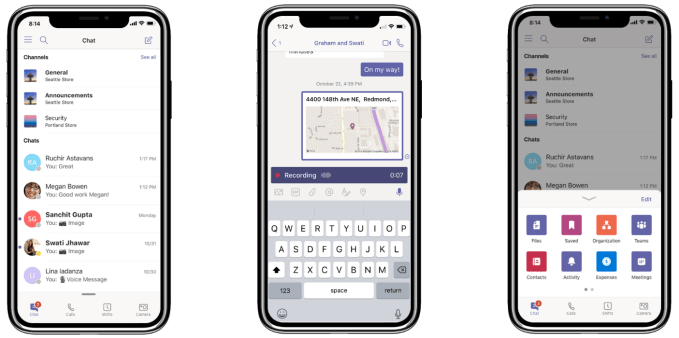Microsoft’s latest Teams features take aim at shift workers
Collaboration tools tend to be geared toward workers who are sitting at a desk for much of the day, but there are plenty of shift workers, also known as first-line workers, who rarely use a computer, but still need to communicate with one another and management. Microsoft released several new features today aimed at including these workers.
In a blog post announcing the new features, Emma Williams, Microsoft corporate vice president for modern workplace verticals, wrote that there are two billion such workers. By making the product more mobile-friendly and linking to existing enterprise employee management systems, Microsoft can make Teams more relevant for shift employees.
For starters, Microsoft is making mobile Teams more flexible to meet the needs of a variety of shift worker jobs. Some might need to record and share audio messages, while others might need to share their location or access the camera. Whatever the requirements, Microsoft has started with a Firstline Worker configuration policy template, which IT can customize to meet the needs of various worker types.
The mobile tool also includes a navigation bar, which allows workers to add the tools they use most often for easy access. The idea is to make it as simple as possible to access the tools they need, given that these workers tend to be on their feet or on the move a good part of the day.
Photo: MicrosoftNext, the company has released a new API to help IT connect Teams to existing workforce management systems. The Graph API for Shifts enables first-line managers, who are responsible for setting up worker schedules, to share data between a company’s workforce management system and Teams, allowing employees to get all of their shift information in one tool. This will be available in public preview later in the quarter, according to the company.
Finally, the tool now includes a new Praise feature, designed to let managers recognize good work by their employees by issuing badges with messages like “Thank you” and “Problem solver.”
The company wants Teams to be more than a tool for knowledge workers. These new features provide a way to include workers that are sometimes left out of these kinds of collaboration tools. The new features also help Microsoft compete with a number of startups that trying to attack the same problem.
These include Crew, a startup that scored a $35 million Series C round just last month and has raised almost $60 million, and Zinc, which also takes aim at the deskless worker, and has raised $16 million, according to Crunchbase.
Whether Microsoft can appeal to both the knowledge worker and the first-line variety in the same tool remains to be seen, but these updates are clearly an effort to take on this space.
Powered by WPeMatico